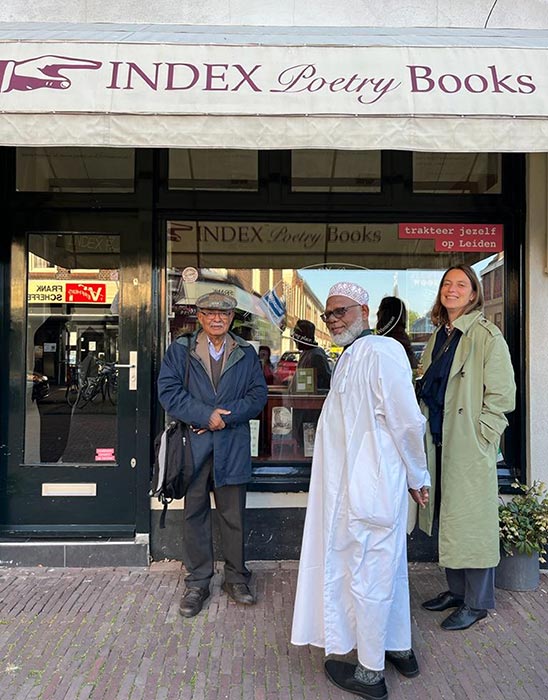Leiden Centre for Indian Ocean Studies (LCIOS)
In early 2017, several Leiden-based Indian Ocean scholars decided to sit together over coffee. The initial aim was simple: to find out what colleagues from different backgrounds were working on. Not long afterwards, the Leiden Centre for Indian Ocean Studies was born, with IIAS as its main hub of activities. During our informal lunch meetings at the IIAS seminar room, typically in the presence of Indonesian culinary delights, we invited visiting scholars to present their ongoing or nearly finished research.
Over time, the LCIOS also hosted and participated in Indian Ocean roundtables. In the process, we attempted to create a platform for interested academics, students, and the general public to keep track of this fast-developing area of study. Thus far, most of our events have taken shape around the theme of connections, including in religion, culture, language, colonial history, and socio-economic and environmental problems.
Our first conference was held at the Ashoka University in India on 27-30 August 2019. Titled “Customizing Sharia: Matrilineal Muslims and Islamic Law in the Indian Ocean Littoral,” we brought together over thirty scholars from Asia, Africa, Europe, and North America to discuss a topic of transoceanic relevance: the connections and comparative potential of diverse matrilineal Muslim communities in maritime Asia and Africa. As a senior participant noted, in her career that spans across four decades, it was the first attempt to bring such diverse specialists of the same topic under one roof. The conference also hosted a theatre group of twelve artists from the Minangkabau community in West Sumatra, Indonesia. Their performance on the intricacies of matrilineal Islam received a standing ovation from the audience.
The pandemic forced us to temporarily organize our activities online. As a happy result, we saw more interaction between scholars – especially from India, Indonesia, Kenya, Sri Lanka, South Africa, Réunion, Singapore – than would have been possible onsite. We decided to use our Zoom classroom to promote new book publications on the Indian Ocean. On popular request, we also organized a roundtable discussion titled Indian Ocean and Epigraphy (10 December 2021) to discuss what it means to study epigraphy from an Indian Ocean framework. The connections between the speakers, research topics, and regions were so numerous that we were gently pushed to organize a second roundtable, Indian Ocean and Epigraphy II (28 March 2022), to compare multiple experiences on the written heritage of Indian Ocean societies.
As the world slowly opened up, we organized another conference titled “Spiced Islam and Textual Circulations: India, Indonesia and the Indian Ocean,” held on 28-29 November 2022 at Universitas Islam Negeri, Jakarta. More than twenty specialists discussed the intellectual and textual circulations between Islamized South and Southeast Asia, exploring their role in socio-cultural formations and transformations. Several participants emphasized that the mystical, ethical, legal, literary, culinary, commercial, and codicological dimensions of textual corpora – in all their diversity – provided a comparative lens to study cultural contact at large. The vernacularization of Islam in particular proved to be a fascinatingly detailed story of exchanges between different ports. Inspired by the discussions that ensued, we aim to organize a follow-up conference in 23-24 October 2023, focusing on the material cultural aspects of Islamic connections across the Bay of Bengal. The event will be co-organized by Universitas Islam Negeri, the Indonesian International Islamic University, and the Nahdlatul Ulama University of Indonesia, with funding from the Indonesian Ministry of Education and Culture.

A poetry reading at Index Books in Leiden, marking the release of In This Fragile World: Swahili Poetry of Commitment by Ustadh Mahmoud Mau. Left to right: Mahmoud Ahmed Abdulkadir (“Mahmoud Mau”), Farouk Topan, Clarissa Vierke, and Annachiara Raia.
The centrality of cultural exchanges – many of which remain poorly studied – also prompted us to organize a one-day workshop on a writing tradition from Kerala. Titled “Ponnāni Script versus Arabic Script? Scribal Practices among Muslims of Malabar,” the event was held on 19 June 2023 in collaboration with the Centre for Ḥaḍramī Studies at the Sabeelul Hidaya Islamic College in Malappuram. It foregrounded the impact of plurilingualism on the local scribal and calligraphic traditions. With a dozen specialists from the region and beyond, we explored the intricacies of a vernacular scribal style known in Malayalam as ponnāni lipi and in Arabic as khaṭṭ al-funnāni. The participants took different critical approaches to comprehend the nuances of this script and its long historical trajectories, relying on textual and material evidence.
Meanwhile, we have benefited from a visit to Europe by Mahmoud Ahmed Abdulkadir, who had been invited by the African Studies Centre and Leiden University Centre for the Arts in Society. Mr. Abdulkadir is a poet, imam, and intellectual from Lamu, Kenya, who is known for his critical voice in the face of social ills and injustices. Together with Annachiara Raia, we co-organized a roundtable discussion on commitment, Islam, and social justice in his Swahili poetry. Six invited scholars provided examples from their own fields and areas, followed by responses from Mr. Abdulkadir and finally a double book launch.
The coming year will bring closer collaborations with especially Indonesian institutes. The ICAS 13 conference held in Surabaya in 2024 is a perfect venue to strengthen our ties with existing partners, such as Airlangga University, and to forge new ones. Our long-standing plan to organize Indian Ocean winter schools, to which Covid put an untimely end, might perhaps be revived as well. In the end, it all depends on the input we receive from the growing community of affiliated Indian Ocean scholars around the world.
Mahmood Kooria is a Researcher at Leiden University and a Coordinator of the Leiden Centre for Indian Ocean Studies (LCIOS).
Tom Hoogervorst is a Researcher at the KITLV and a Coordinator of the Leiden Centre for Indian Ocean Studies (LCIOS).